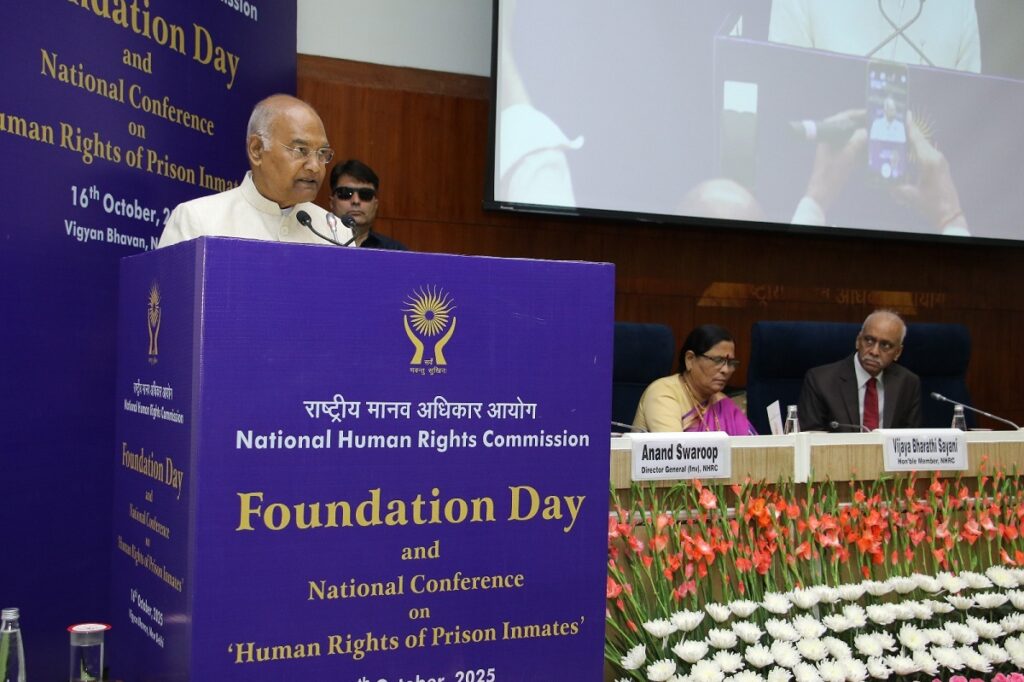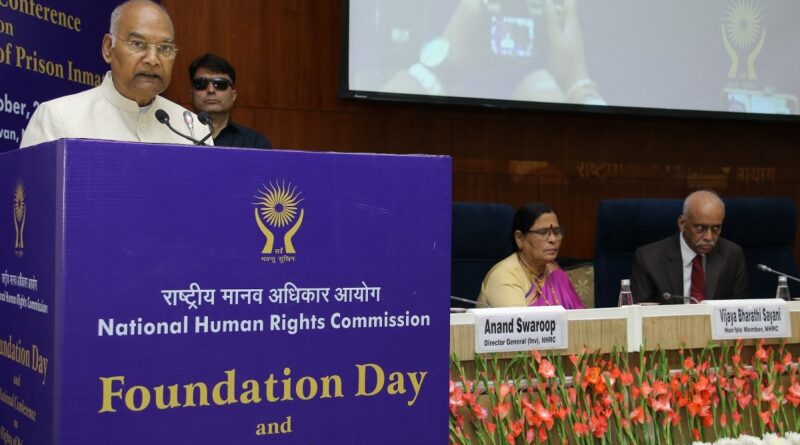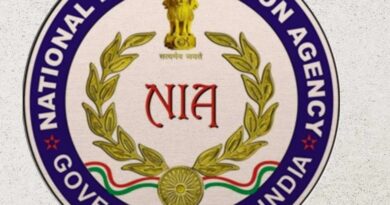Towards a Humane Republic’: Kovind, Justice V. Ramasubramanian Reflect on Human Rights at NHRC’s 32nd Foundation Day
(By Syed Ali Taher Abedi)
New Delhi, October 12: Marking its 32nd Foundation Day, the National Human Rights Commission (NHRC) convened a National Conference on the ‘Human Rights of Prison Inmates’ at Vigyan Bhawan on Saturday, reaffirming its commitment to safeguarding dignity and justice for all. Addressing the gathering as Chief Guest, former President of India Ram Nath Kovind reflected on India’s deep-rooted human rights ethos, noting that “long before the modern articulation of human rights, our sages and scriptures spoke of the duty to uphold dharma, act with compassion, and ensure justice.” He emphasized that this moral legacy continues to inspire the nation, underscoring that the protection of human rights is not merely a legal duty but a spiritual and moral imperative intrinsic to the Indian way of life.

Kovind said that India has built a robust and comprehensive framework of human rights. The NHRC, India, since its inception in the year 1993, has evolved into one of the most respected human rights institutions in the world. Commemorating its 32nd Foundation Day is more than just an institutional milestone.
Highlighting the occasion as a moment to renew the nation’s commitment to the enduring constitutional values of justice, liberty, equality and fraternity, the speaker underscored the pivotal role of the National Human Rights Commission in championing these principles. He said the Commission, through its investigations, advisories, interventions and advocacy, has given voice to the voiceless and placed human rights at the centre of governance. Reaffirming India’s civilizational ethos, he observed that the true measure of a society lies in the way it protects and treats its most vulnerable members.
He (Kovind) further emphasized that amid rapid technological, environmental, and societal shifts, informal workers face the greatest human rights risks—unsafe conditions, irregular pay, and lack of protection. Their dignity must match the value of their labour. Economic growth must align with human dignity. He also highlighted climate-induced displacement, the universal right to identity and services, and recognized mental health as a vital human right, praising NHRC’s efforts.
Delivering a comprehensive account of the Commission’s legacy, NHRC Chairperson, Hon’ble Justice (Retired)V. Ramasubramanian, traced the institution’s remarkable journey over the past 32 years, underscoring its pivotal role in upholding the constitutional promise of human dignity and justice. He informed that since its inception, the Commission has dealt with over 23 lakh cases, including nearly 2,900 matters taken up Suo motu, and has recommended monetary relief exceeding ₹263 crore in more than 8,000 cases of human rights violations.
In the past year alone (since October 2024), the Commission registered about 73,000 complaints and over 100 Suo motu cases, conducted 63 spot inquiries, and disposed of more than 38,000 cases, granting over ₹9 crore as compensation in around 200 matters. Justice Ramasubramanian also highlighted the NHRC’s collaborative efforts with educational and institutional bodies to advance human rights awareness and capacity-building programmes, particularly for students, civil servants, and senior functionaries of the National Human Rights Institutions (NHRIs) of the Global South.
He noted that the Commission has constituted 12 core groups comprising experts, NGOs, and senior government officials on thematic areas of human rights to evaluate governmental schemes and recommend systemic improvements. Referring to the three core group meetings and four open-house discussions held over the past year, he emphasized the progressive exchanges that culminated in the proposal to establish a dedicated forum of Global South NHRIs, symbolizing India’s leadership in the global human rights discourse.
Justice Ramasubramanian concluded by reaffirming that the Commission, guided by its Hon’ble Members and dedicated staff, continues to uphold the standards set by its illustrious predecessors, striving to meet the legitimate expectations of victims of human rights violations and serve as a vigilant sentinel of justice.
Earlier, in his welcome address, Bharat Lal, Secretary General, NHRC, described the Commission as the “conscience keeper” of human rights in Indian democracy, asserting its unwavering commitment to safeguarding the dignity of the most vulnerable and marginalized sections of society through its sustained interventions and institutional vigilance.




